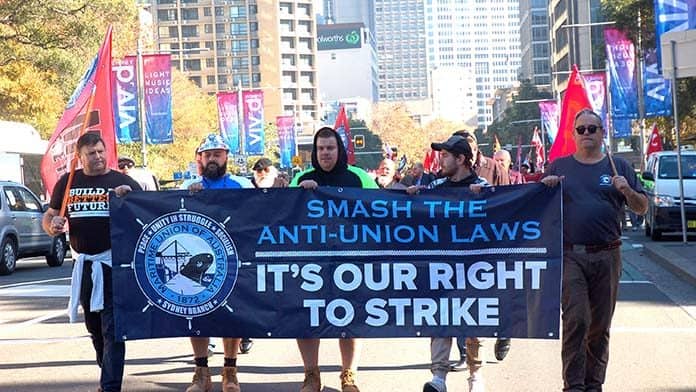The Labor government wants to paint the CFMEU as thuggish and criminal.
The media claims of links to organised crime or corrupt behaviour are all still just allegations—with no one found guilty and no new charges since the media campaign broke.
So instead they are depicting the union as criminal for breaking industrial laws.
Australia has some of the most restrictive anti-strike laws in the developed world.
Industrial action is illegal outside of narrow “bargaining periods” for new enterprise agreements every three or four years. This means that if an enterprise agreement is finalised, but the boss reneges on promises like safety or redundancy payments or sacks workers, strike action is forbidden.
Even during strikes, picket lines that prevent scabs or deliveries entering a worksite are illegal, helping bosses to make strikes ineffective. CFMEU members at Cross River Rail in Brisbane were recently banned from picketing anywhere within 15 metres of site entrances.
Strikes can also be banned if Fair Work decides they would “damage the economy”. This has seen power workers in NSW essentially lose any right to strike, with the companies claiming strikes might produce power failures.
Action in support of another group of workers, such as solidarity strikes in refusing to cross a picket line or to move goods subject to a union ban, are illegal “secondary boycotts”.
And strikes for political reasons are illegal, such as those against the new laws targeting the CFMEU or for Palestine.
The process of authorising legal strike action is also extremely restrictive. Unions must apply to the Fair Work Commission for a protected action ballot, have more than 50 per cent of union members return a vote and win majority support for action.
The boss must receive three days’ written notice of any industrial action, unless it is in response to action by the employer (such as a lockout), giving them ample time to prepare for any disruptions.
The CFMEU has repeatedly faced court for entering worksites without permission, stoppages to demand safety measures and other industrial action.
The union was fined $2.4 million after it organised a two-day strike at Barangaroo in 2014 to defend a union delegate that the company sacked.
Unlawful strike action in Queensland against John Holland during enterprise bargaining at the Enoggera Army Barracks and QUT’s Kelvin Grove Campus led to $817,500 in fines. The union had organised strikes, picket lines and swore at scabs.
One recent fine of $168,000 that the Financial Review labelled “typical of the CFMEU’s contraventions” was for a 2019 incident on the West Gate Tunnel Project in Melbourne.
CFMEU officials were attempting to ensure job safety following disputes with the employer. They climbed on top of a scaffold deck to stop work, refusing to leave until safety issues were fixed.
The Fair Work Commission says the CFMEU has broken the law more than 2600 times in the past 20 years, costing the union more than $24 million in fines.
Breaking industrial laws is not serious criminal activity—but the bosses hate it because it hurts their profits.
The CFMEU is right to defy the law to fight for safety, pay rises and workers’ rights. We need more unions willing to break bad laws—and they should refuse to pay the resulting fines as well.
It is the CFMEU’s militancy and effectiveness as a union that has put it in the sights of the bosses, the mainstream media and the government—not allegations of criminality or corruption. It deserves every worker’s support.
By Luke Ottavi






